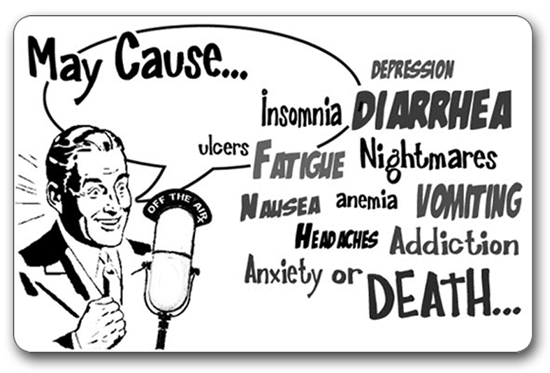
Managing New Hep C Drug Side Effects
Managing New Hep C Drug Side Effects
February 28, 2012
Combining two different medical traditions may provide the best relief for side effects originating from the latest Hepatitis C drugs.
By Nicole Cutler, L.Ac.
With the addition of two newly approved drugs in 2011, battling chronic Hepatitis C has made great strides within the past year. Previous Hepatitis C treatment had a 50 percent chance of eliminating this viral infection of the liver. However, adding one of the two new drugs (boceprevir or telaprevir) to the drug regimen has substantially increased the odds of successful Hepatitis C treatment. Unfortunately, boceprevir and telaprevir come with their fair share of side effects. As Western medical doctors race to find pharmaceutical solutions for these side effects (which likely have side effects of their own), doctors of Chinese Medicine have a lesser known – but less hazardous – side effect management approach.
Practitioners of Chinese Medicine, typically acupuncturists and herbalists with a degree in TCM (Traditional Chinese Medicine), are finally taking their place alongside Western medical doctors in treating and managing Hepatitis C. Western medical doctors are trained to analyze disease by segregating the problem and looking closely for solutions – often on a microscopic or chemical level. On the other hand, TCM practitioners are trained to analyze a person’s overall wellness and follow strategies to help them regain balance. Because Western medicine practice typically sees people’s ailments from a microscopic perspective, and Eastern medical practice typically looks with a telescopic perspective, each practice has a limited potential for healing. Although, combining these two approaches almost always results in the best possible patient outcome.
New Drug Side Effects
Belonging to the category of Hepatitis C protease inhibitors, boceprevir (Victrelis) and telaprevir (Incivek) are added to pegylated interferon plus ribavirin to shorten the course of treatment and increase the likelihood of a cure. Pegylated interferon plus ribavirin have their own associated adverse effects, some being severe enough to interfere with therapy completion.
Thankfully, the problems arising from the new protease inhibitors don’t seem to be as severe. A review from Paris appearing in the February 2012 supplemental issue of Liver International announced that the side effects of boceprevir and telaprevir are typically mild to moderate and usually can be managed without stopping therapy. In clinical trials for both drugs, researchers observed an increase in the frequency and severity of anemia, while the telaprevir combination regimen was associated with more skin symptoms including rash itching. However, lead researcher Christophe Hézode points to their manageability by noting “these adverse events are generally manageable and do not lead to early discontinuation.”
Anemia
A component of just about every Hepatitis C drug regimen, ribavirin can destroy red blood cells, causing hemolytic anemia. Unfortunately, boceprevir and telaprevir both aggravate anemia by contributing to bone marrow suppression:
• An estimated 50 percent of those taking boceprevir (with interferon and ribavirin) develop anemia.
• An estimated 40 percent of those taking telaprevir (with interferon and ribavirin) develop anemia.
• An estimated 20 percent of those taking just pegylated interferon plus ribavirin develop anemia.
Western medical approaches to this problem typically revolve around reducing ribavirin dosage or using erythropoietin drugs (Epogen or Procrit) to stimulate red blood cell production. Although an erythropoietin could help someone get through Hepatitis C treatment, it may lead to additional side effects such as hypertension; joint, muscle or bone pain; fever; cough; rash; nausea or vomiting; itching; headache; seizures; and blood clots.
Practitioners of TCM have a more natural way to help those with anemia. By following TCM treatment strategies that focus on blood tonification and nourishing bone marrow cells, this type of medicine can help reduce reliance on a fourth medication for completing Hepatitis C treatment.
Skin Problems
Pegylated interferon plus ribavirin are associated with skin problems like itching, dry skin and eczema. However, Hepatitis C protease inhibitors (especially telaprevir) increase the frequency of these side effects:
• An estimated 55 percent of those on telaprevir (with interferon and ribavirin) develop a rash.
• An estimated 33 percent of those just taking pegylated interferon and ribavirin develop a rash.
Western medical approaches to these problems typically revolve around using topical corticosteroids, moisturizers or oral antihistamines. The oral antihistamines may carry some additional side effects (like hypertension, sleepiness, constipation and dry mouth), while short-term administration of moisturizers and topical corticosteroids typically have minimal side effects.
Eastern medical practitioners may have another approach toward helping patients with itching, rash and dry skin. By following TCM treatment strategies that focus on cooling the blood and enhancing the body’s internal moisture levels (tonifying the yin), this type of medicine can help ease dermatological complaints in a holistic (perceiving the body as a whole), natural manner.
There is little doubt that Hepatitis C treatment has recently improved and continues to make progress; however, drug side effects persist. By considering combining styles of medicine born from the West and the East, people undergoing these challenging medication regimens have an even greater chance of finally beating the Hepatitis C virus.